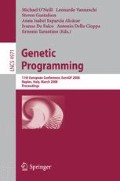Abstract
Pareto competitive models of coevolution have the potential to provide a number of distinct advantages over the canonical approach to training under the Genetic Programming (GP) classifier domain. Recent work has specifically focused on the reformulation of training as a two-population competition, that is learners versus training exemplars. Such a scheme affords, for example, the capacity to decouple the fitness evaluation overhead from the data set size through sub sampling while naturally encouraging ‘teams’ or composite solutions as opposed to solutions based on a single individual alone. One outstanding question with respect to the latter characteristic is with regards to the nature of the team (archive) behavior in terms of pattern coverage. That is to say, which models are used when, and what are the implications for solution modularity as it relates, for example, to the assignment of exemplars to solution participants. The current work investigates two Pareto competitive approaches to classification under GP, with one configured to employ an explicitly cooperative multi-objective cost function based and the other employing the classical (error-based) cost function. We empirically demonstrate a critical distinction between the two with regards to problem decomposition, with the capacity to provide a decomposition into unique behaviors being much more prevalent when co-operative mechanisms are explicitly supported.
Access this chapter
Tax calculation will be finalised at checkout
Purchases are for personal use only
Preview
Unable to display preview. Download preview PDF.
References
de Jong, E.D., Pollack, J.B.: Ideal evaluation from coevolution. Evolutionary Computation 12(2), 159–192 (2004)
Ficici, S.G., Pollack, J.B.: Pareto optimality in coevolutionary learning. In: European Conference on Artificial Life, pp. 286–297 (2001)
Harper, R., Blair, A.: A structure preserving crossover in Grammatical Evolution. In: IEEE Congress on Evolutionary Computation, vol. 3, pp. 2537–2544 (2005)
Kumar, R., Rockett, P.: Improved sampling of the pareto-front in multi-objective genetic optimizations by steady-state evolution. Evolutionary Computation 10(3), 283–314 (2002)
Lemczyk, M., Heywood, M.I.: Training binary GP classifiers efficiently: a pareto-coevolutionary approach. In: Ebner, M., O’Neill, M., Ekárt, A., Vanneschi, L., Esparcia-Alcázar, A.I. (eds.) EuroGP 2007. LNCS, vol. 4445, pp. 229–240. Springer, Heidelberg (2007)
Lichodzijewski, P., Heywood, M.I.: Pareto-coevolutionary Genetic Programming for problem decomposition in multi-class classification. In: Proceedings of the Genetic and Evolutionary Computation Conference (GECCO), vol. 1, pp. 464–471 (2007)
McIntyre,A.R.: Novelty Detection + Coevolution = Automatic Problem Decomposition: A Framework for Scalable Genetic Programming Classifiers. PhD thesis, Faculty of Computer Science, Dalhousie University (2007), http://www.cs.dal.ca/~mheywood/Thesis
McIntyre, A.R., Heywood, M.I.: Multi-objective competitive coevolution for efficient GP classifier problem decomposition. In: Proceedings of the IEEE International Conference on Systems, Man, and Cybernetics (SMC), pp. 1930–1937 (2007)
Newman, D.J., Hettich, S., Blake, C.L., Merz, C.J.: UCI repository of machine learning databases (1998), http://www.ics.uci.edu/~mlearn/mlrepository.html
Noble, J., Watson, R.: Pareto coevolution: Using performance against coevolved opponents in a game as dimensions for pareto selection. In: Proceedings of the Genetic and Evolutionary Computation Conference (GECCO), pp. 493–500 (2001)
O’Neill, M., Ryan, C.: Grammatical Evolution: Evolutionary Automatic Programming in an Arbitrary Language, May 2003. Springer, Heidelberg (2003)
Yo, T.S., de Jong, E.D.: A comparison of evaluation methods in coevolution. In: Proceedings of the Genetic and Evolutionary Computation Conference (GECCO). SIGEVO, vol. 1, pp. 479–486 (2007)
Author information
Authors and Affiliations
Editor information
Rights and permissions
Copyright information
© 2008 Springer-Verlag Berlin Heidelberg
About this paper
Cite this paper
McIntyre, A.R., Heywood, M.I. (2008). Cooperative Problem Decomposition in Pareto Competitive Classifier Models of Coevolution. In: O’Neill, M., et al. Genetic Programming. EuroGP 2008. Lecture Notes in Computer Science, vol 4971. Springer, Berlin, Heidelberg. https://doi.org/10.1007/978-3-540-78671-9_25
Download citation
DOI: https://doi.org/10.1007/978-3-540-78671-9_25
Publisher Name: Springer, Berlin, Heidelberg
Print ISBN: 978-3-540-78670-2
Online ISBN: 978-3-540-78671-9
eBook Packages: Computer ScienceComputer Science (R0)

